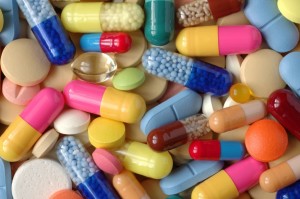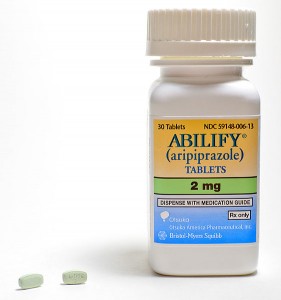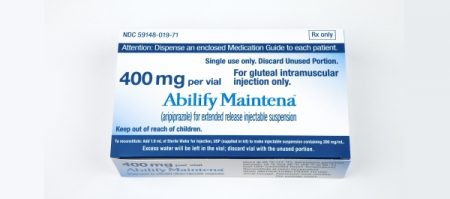Atypical Antipsychotic Drug Aripiprazole Appropriate for Pregnancies
 A 2017 systematic review in the Journal of Affective Disorders found that the atypical antipsychotic medication apripiprazole (Abilify) was relatively safe for use during pregnancy and lactation. Researcher Alessandro Cuomo and colleagues reviewed 93 articles from the last two decades of research.
A 2017 systematic review in the Journal of Affective Disorders found that the atypical antipsychotic medication apripiprazole (Abilify) was relatively safe for use during pregnancy and lactation. Researcher Alessandro Cuomo and colleagues reviewed 93 articles from the last two decades of research.
Placebo-controlled research on medications used during pregnancy are uncommon, due to ethical reservations about assigning women randomly to each group when their fetus may be affected. However, Cuomo and colleagues were able to find some large prospective studies and large database studies that shed light on aripiprazole’s safety during pregnancy. They concluded that the data on aripiprazole during pregnancy and breastfeeding were “relatively reassuring” and that the benefits of aripiprazole outweigh the potential risks.
Risks of relapse upon discontinuing a mood stabilizer can be as high as 80%. Illness in the mother conveys risks to the fetus, so the risk-benefit ratio may suggest that staying on effective aripiprazole treatment during pregnancy and lactation makes sense for many patients.
In a comment on the study reported by Reuters Health, Dr. Jennifer L. Payne of the Johns Hopkins School of Medicine said, “The main reason to discontinue aripiprazole for pregnancy…would be if it is not working and the mother is actively ill, or if she insisted on doing so. In my mind, the literature supports the use of aripiprazole during pregnancy in mothers with serious mental illness who are responding well to the medication.”
FDA Approves Extended-Release Aripiprazole Injected Monthly to Prevent Manic and Mixed Episodes in Bipolar I
In 2017 the US Food and Drug Administration approved a monthly injectable form of the atypical antipsychotic drug aripiprazole, Abilify Maintena, for the prevention of manic and mixed episodes in bipolar I disorder. The intramuscular injections are available for monotherapy in preparations of 300 mg or 400 mg. Maintena did not prevent depressive episodes.
Maintena is already FDA-approved for the treatment of schizophrenia and Tourette’s syndrome in adults.
The approval for bipolar I disorder follows a 52-week phase 3, double-blind, placebo-controlled randomized trial. Participants were experiencing a manic episode during screening for the study, met the criteria for bipolar I disorder, and had had at least one prior manic or mixed episode severe enough to require treatment.
Compared to placebo, Maintena in once-a-month injections delayed the recurrence of any mood episode following the initial manic episode at screening. When the researchers separated their analysis based on type of episode, Maintena reduced manic and mixed episodes compared to placebo, but did not do a better job than placebo at preventing depressive episodes.
An oral antipsychotic must be administered for 14 days following the first injection of Maintena. The extended-release injection is available as 300 mg– or 400 mg–strength powder that may be reconstituted, or as prefilled syringes.
Editor’s Note: Because Maintena is delivered as a once-a-month injection, it may be helpful for patients who struggle to take daily oral medications.
Long-Acting Injectable Aripiprazole Approved for Schizophrenia
 In October, the US Food and Drug Administration (FDA) approved an injectable, long-acting version of the atypical antipsychotic aripiprazole for the treatment of adults with schizophrenia.
In October, the US Food and Drug Administration (FDA) approved an injectable, long-acting version of the atypical antipsychotic aripiprazole for the treatment of adults with schizophrenia.
The long-acting aripiprazole is administered every 4 to 6 weeks as an injection in the arm or buttocks. The company announced that it would begin releasing the drug immediately. The drug preparation for maintenance treatment is named Maintena while the preparation for acute treatment is named Aristada.
Dopamine Partial Agonists: An Overview
 Several atypical antipsychotic drugs are partial agonists of dopamine. They provide weak stimulation of dopamine receptors in the brain and prevent dopamine from overstimulating the receptors by binding to them in its place.
Several atypical antipsychotic drugs are partial agonists of dopamine. They provide weak stimulation of dopamine receptors in the brain and prevent dopamine from overstimulating the receptors by binding to them in its place.
In contrast, most antipsychotic and antimanic drugs are dopamine antagonists, which also bind to dopamine receptors but prevent any stimulation from occurring there.
A. Aripiprazole (Abilify) was the first partial dopamine agonist approved by the Food and Drug Administration for the treatment of schizophrenia, and mania, and as an add-on treatment to antidepressants for the treatment of unipolar depression, but not bipolar depression.
B. Brexpiprazole (Rexulti) received FDA approval for the treatment of schizophrenia and as an add-on treatment to antidepressants for the treatment of unipolar depression in 2015. It is similar to aripiprazole but has weaker activity at the dopamine D2 receptor. Brexpiprazole is associated with small increases in the hormone prolactin, as opposed to the small decreases in prolactin seen with aripiprazole.
C. Cariprazine (Vraylar) is FDA-approved for schizophrenia and mania, and it also has positive placebo-controlled data in bipolar depression and as an adjunct to antidepressants in unipolar depression. It differs from the others in that it is more potent at dopamine D3 receptors than at D2 receptors. It is thought that effects on D3 receptors may provide better antidepressant effects, but this proposition has not yet been tested.
Effect Size of Autism Treatments
At the 2014 meeting of the American Academy of Child and Adolescent Psychiatry, Fung et al. presented a meta-analysis of treatments for autism that ranked them in terms of statistical effect size, ranging from 0.9 (large), to 0.5 to 0.8 (medium), to <0.4 (small). The only drug with a large effect size was risperidone, at 0.9. Most effect sizes were medium, including aripiprazole at 0.8 and N-acetylcysteine (NAC) at 0.7. Both clonidine and methylphenidate had effect sizes of 0.6, and tianeptine’s was 0.5.
Fung and colleagues noted that the first two on the list, the atypical antipsychotics risperidone and aripiprazole, often have problematic side effects (such as sedation, weight gain, and motor symptoms) that must be balanced against their effectiveness. In contrast, NAC is well tolerated with few side effects, and two placebo controlled studies showed that it was effective both alone and as an adjunctive treatment to the antipsychotic risperidone.
Aripiprazole Makes Lamotrigine More Effective
 In a poster at the 9th International Conference on Bipolar Disorder (ICBD) held in Pittsburgh in 2011, Rahman and colleagues reported that in patients being treated for bipolar disorder, the addition of atypical antipsychotic aripiprazole to maintenance treatment with lamotrigine was more effective than the addition of placebo to the same maintenance treatment with lamotrigine. Improvements in Young Mania Rating Scores (YMRS) with the combination of aripiprazole plus lamotrigine were significantly greater than that of lamotrigine plus placebo.
In a poster at the 9th International Conference on Bipolar Disorder (ICBD) held in Pittsburgh in 2011, Rahman and colleagues reported that in patients being treated for bipolar disorder, the addition of atypical antipsychotic aripiprazole to maintenance treatment with lamotrigine was more effective than the addition of placebo to the same maintenance treatment with lamotrigine. Improvements in Young Mania Rating Scores (YMRS) with the combination of aripiprazole plus lamotrigine were significantly greater than that of lamotrigine plus placebo.
Editor’s note: These data add to a growing literature that shows that an atypical antipsychotic added to a mood stabilizer is associated with better prophylactic effects than use of the mood stabilizer alone. Previously, most of the studies of this type of combination used lithium or valproate as the mood stabilizer and, to our knowledge, this is the first to demonstrate that long-term prevention with lamotrigine is enhanced by the addition of an atypical antipsychotic.
Many of the atypical antipsychotics are FDA-approved as adjunctive treatments to mood stabilizers in the long-term treatment of bipolar disorder. The controlled clinical trial data that led to this FDA approval support the practice of many clinicians who prescribe combination treatment rather than monotherapy in order to achieve a more rapid onset of anti-manic stabilization and longer-term maintenance effects. The use of aripiprazole and quetiapine as adjuncts to lithium and valproate is particularly common in bipolar disorder since the same atypical antipsychotics are FDA-approved as adjunctive treatments in unipolar depression, and clinicians are familiar with prescribing them to improve ineffective acute antidepressant treatment.
One Expert’s Personal Treatment Algorithm for Bipolar Disorder in Young Children
EDITOR’S NOTE: Dr. Gagin Joshi of Massachusetts General Hospital, who presented the work on carbamazepine and lamotrigine on page 1 provided us with his own general treatment algorithm for youngsters with bipolar disorder.

Omega-3 Fatty Acids (photo from ironmagazine.com)
Joshi typically starts with 0.5 to 2 gms of omega-3 fatty acids because of their benign side-effects profile, the many studies suggesting they are effective in adult mood disorders, and a recent article indicating that they were effective in preventing the conversion of prodromal schizophrenia into full-blown illness in a randomized double-blind controlled study in Australia.
After the omega-3 fatty acids, Joshi’s second choice is typically the atypical antipsychotic aripiprazole (Abilify) because of its lesser degree of weight gain compared to atypicals quetiapine (Seroquel) or risperidone (Risperidol). Risperidone can be a third option if aripiprazole is not effective or tolerated.
Aripiprazole and Ziprasidone Are Two of the Best-Tolerated Atypicals
We’ve recently posted about some of the reasons aripiprazole and ziprasidone can make good choices for treatment.
Read about aripiprazole here and here.
Read about ziprasidone here.
Aripiprazole (Abilify), the Atypical Atypical Antipsychotic
This is an overview of the drug aripiprazole.
Spectrum of Efficacy
Aripiprazole has now been approved for acute and maintenance treatment of pediatric patients with bipolar disorder from ages 10 to 17. It had already been approved for adult bipolar disorder, schizophrenia, and as an adjunctive treatment for acute unipolar depression inadequately responsive to antidepressants of the serotonin-selective class or the serotonin-norepinephrine reuptake inhibitor venlafaxine. Aripiprazole, along with risperidone, is one of only two drugs FDA-approved for the treatment of irritability in autism.
Read more
Adjunctive Aripiprazole Good for Core Symptoms of Unipolar Depression
Adding aripiprazole to the drug regimen of a patient with major depression was significantly superior to adding placebo on most of the core symptom items of major depression in a pooled analysis of several studies. Martin et al. presented these data in a poster at the American Psychiatric Association meeting in San Francisco in May 2009. The improved areas included: trouble falling asleep, feeling sad, low mood, decreased appetite, view of the self, view of the future, thoughts about death/suicide, general interest, capacity for pleasure/enjoyment, interest in sex, and interpersonal sensitivity.
These improvements were accompanied by improvements at a trend or significance level in quality of life after just six weeks of treatment, as well as a generally good side-effects tolerability profile. The most common side effects are akathisia (restless legs) and restlessness, which appear to be less prominent if one starts with very low (pediatric) doses, i.e. 1mg to 2mg/day. The metabolic profile of the drug is relatively benign, with only weight gain occurring significantly more on aripiprazole than on placebo, while there were no significant changes in cholesterol or triglycerides.



